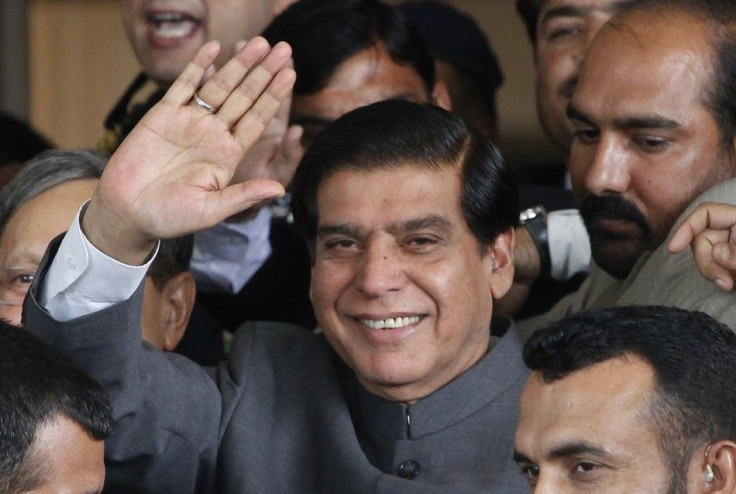Don’t Get Too Comfortable, Mr. Pakistani Prime Minister

The Supreme Court of Pakistan, which is entangled in a lengthy battle for power against the country’s civilian government, has just ordered the arrest of sixteen people -- including Prime Minister Raja Pervez Ashraf -- on charges of corruption in connection with kickbacks and bribes related to power contracts.
The arrest order may complicate Ashraf’s plans to lead the ruling Pakistan’s People’s Party (PPP) in national elections scheduled for May. Ashraf has only held the job since last June.
While, this development may seem strange to eyes and ears in the West, it is simply business as usual in the insane and incomprehensible world of Pakistani politics.
Ashraf himself ascended to power only through the ouster of his predecessor Yousuf Reza Gilani, who also fell afoul of the Supreme Court. Gilani’s “crime” was that he refused to press corruption charges against President Asif Ali Zardari, asserting that the sitting president was immune from such prosecution.
The Court slapped a contempt conviction on Gilani, forcing him out.
These endless dramas highlight how being the Prime Minister of Pakistan may be one of the most insecure political jobs in the world.
Gilani himself might have seen the writing on the wall when he realized he was on the verge of becoming one of the longest-serving prime ministers in Pakistani history.
Officially, he served for 1,489 days -- from March 25, 2008 to April 26, 2012, the day the Supreme Court convicted him of contempt for failing to launch a probe against Zardari for alleged corruption and money laundering.
Ashraf, who was named the new PM after a chaotic weeding out process, became the 22nd prime minister in Pakistan since the country was founded in 1947 following the partition of British India into two nations.
However, it’s more complicated than that -- Benazir Bhutto (Zardari’s wife, who was assassinated) served twice as prime minister (1988-1990 and 1993-1996), while her rival Nawaz Sharif served an amazing three different times.
(Had Bhutto not been assassinated in late 2007, she would have likely tied Sharif’s record for holding the top job on three separate occasions).
By comparison, over the same 1947-2012 period, India has had 17 prime ministers, with Indira Gandhi serving two separate terms. The United States, meanwhile, has had 12 presidents during that time (with Dwight D. Eisenhower, Ronald Reagan, Bill Clinton and George W. Bush each serving full two terms).
In any case, the very first prime minister, Liaquat Ali Khan, who served a total of 1,524 days (roughly four years and two months), holds the record for the longest continuous tenure as Pakistan’s head of government. (Gilani would have at least tied Khan’s record, and perhaps broken it, if the Supreme Court had not been so eager to remove him from power).
On an aggregated basis, Bhutto and Sharif actually held the office of prime minister longer than either Khan or Gilani, but their various terms were interrupted multiple times.
The chaos and turbulence in Pakistan can also be illustrated by the fact that the job of prime minister was abolished on no less than five times-- typically in connection with a military coup, the imposition of martial law or by presidential decree. One of these periods lasted almost 13 years, between October 1958 and December 1971.
This means that during the nearly 66 years of Pakistan’s existence, the country had no prime minister more than one-third of that time. Translated, it means that on average, a Pakistani prime minister lasts in office less than two years -- just one of the many measures of a country that is hopelessly unstable, corrupt and dominated by an ever-lurking military.
(Ashraf has so far lasted about seven months).
Under the terms of Pakistan’s constitution, a prime minister has a term of five years, but no one has ever finished such a period without interruption in office.
The “end” of a term can come in a variety of ways -- sometimes even by violence.
Indeed, the first prime minister, the aforementioned Liaquat Ali Khan, was assassinated in 1951 in an incident that remains mysterious as to motive as well as due to the lack of a proper investigation by police.
Zulfikar Ali Bhutto, perhaps the most dominant and well-known Pakistani prime minister ever, was forced out by a military coup and later executed in April 1979. His daughter, Benazir, died in a hail of bullets almost three decades later while campaigning for re-election after a period of self-imposed exile.
In most cases, the prime minister was dismissed or was forced to resign, typically after running afoul of the military or the president (or both).
One prime minister, Nurul Amin, served in office only 13 days in December 1971, as the country was on the brink of the civil war in East Pakistan, a war that led to the independence of the new nation of Bangladesh (Amin was a Bengali).
Now, one can only speculate how long Prime Minister Raja Pervez Ashraf will last in office.
© Copyright IBTimes 2024. All rights reserved.




















